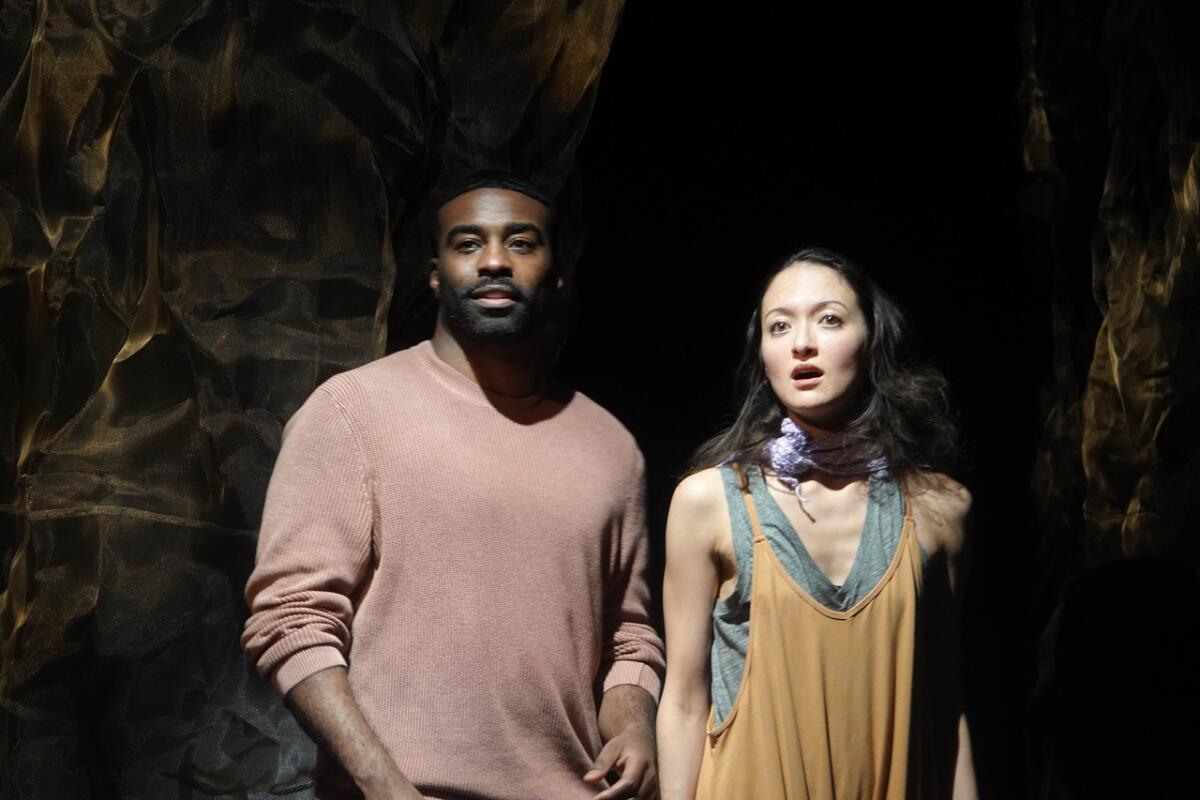Rogue Machine is back with a winner in Daf James’ ‘On the Other Hand, We’re Happy’

- Share via
The play that has my vote for best title, “On the Other Hand, We’re Happy,” is one of those small-scale works that make city life such a pleasure.
Encountering this Rogue Machine production at the Matrix Theatre feels serendipitous. This extraordinarily well-acted U.S. premiere is a reminder of what we’ve been missing while marooned on our sofas during the COVID-19 pandemic.
This shape-shifting play by Daf James, one of Wales’ most talked-about playwrights, casts three actors into a network of roles that are at once intimately connected and worlds apart. The unfolding story concerns love, parenting, adoption and collective responsibility for one another’s well-being.
Yes, this is indeed a play about happiness — which is to say it is a play about learning how to coexist with sorrow.

“On the Other Hand, We’re Happy” is written in beats, condensed interactions that are more like movements, one leading to the next with only the actors to indicate the shift in time, place and personnel. This free-form style evokes the work of another inventive British playwright, Duncan Macmillan (“People, Places and Things,” “Every Brilliant Thing” and “Lungs”), who similarly combines formal agility with psychological fearlessness.
Staged more or less in the round (as stipulated in the script), this production of “On the Other Hand, We’re Happy” is directed by Cameron Watson with his customary smooth precision. Stephanie Kerley Schwartz’s scenic design reconfigures the Matrix into a cocoon for concentrated viewing.
This is physical theater without the acrobatics. The psychology is unsensationally theatricalized. Fluidity of gesture, intonation and blocking allow for greater dramatic velocity. Chronology jumps freely, revealing interconnections that might not otherwise be apparent.
Christian Telesmar, as sensitive as he is charismatic playing Josh, is paired with Rori Flynn, who plays Abbie, Josh’s romantic partner. Abbie is more intense than Josh, more neurotic in his estimation, but full of passionate feelings about their future together and the world in general.
Josh buys a house; Abbie raises the prospect of a baby. Fertility issues lead to consideration of adoption. While filling out extensive forms, the couple are asked to consider whether they would be OK with a child born to drug-addicted parents. How about one who was HIV-positive? Trauma, mental illness, special needs?
Moral questions such as these are put directly to the audience. What would we do? (Must we tell the truth?) Josh apologizes for springing this audience interaction on us. In truth, it really didn’t seem like that kind of play until he asked whether any of us ever feared being killed by one of our children. (Never crossed my mind, but then I don’t have kids.)
Fortunately, the play accommodates these fourth-wall ruptures without being dominated by them. What initially seems like a gimmick turns out to be much more integral, though this may be apparent only in retrospect, when you’re putting the dramatic pieces together on the drive home.
The sportive rhythm of the show doesn’t preclude tragedy. Without giving too much away, Josh has to make a decision about whether to go ahead with the adoption. Alexandra Hellquist portrays the 4-year-old who grows up before our eyes as well as the birth mother, who was in an abusive relationship with the girl’s drug-addicted father (a cameo role filled in by Telesmar).
Flynn assumes the part of Emma, a social worker sympathetic to Josh’s needs as well as the needs of Tyler, the young girl, and her volatile birth mother, who is unable to provide her daughter with the safe home she deserves. These characters come from social universes that aren’t easily bridged.
Admittedly, the transitions occasionally feel rough, with roles switching rapidly and Tyler leapfrogging from one age to the next. But any confusion is only momentary. The performances maintain their clarity even when pitched to turbulent extremes.
I don’t want to make an overinflated case for the play, which might have found more meaning in a less open-ended chronology. The linear progression seems like it might go on indefinitely. But I left the Matrix exhilarated.
Good theater, expertly produced, will do that. Good theater that challenges us to rethink our concept of family and social obligation. Good theater that trusts the actors to conjure all that a play requires.
Spread the word: This Rogue Machine offering is that proverbial needle in the theatrical haystack.
‘On the Other Hand, We’re Happy’
Where: Matrix Theatre, 7657 Melrose Ave,. L.A.
When: 8 p.m. Fridays, Saturdays, Mondays; 3 p.m. Sundays. Ends April 10.
Tickets: $45
Info: (855) 585-5185 or roguemachinetheatre.net
Running time: 1 hour, 30 minutes
COVID protocol: Proof of full vaccination and booster is required. Masks are required at all times. (Check website for changes.)
More to Read
The biggest entertainment stories
Get our big stories about Hollywood, film, television, music, arts, culture and more right in your inbox as soon as they publish.
You may occasionally receive promotional content from the Los Angeles Times.











